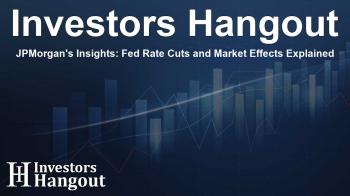JPMorgan's Insights: Fed Rate Cuts and Market Effects Explained

JPMorgan's Concerns on Fed Rate Cuts
Strategists from JPMorgan have raised alarms about the anticipated Federal Reserve interest-rate cuts. They suggest that these changes might not deliver the positive impact on stocks that many investors are hopeful for.
Understanding the Economic Scenarios
Recently, strategists, led by Mislav Matejka, noticed a rising expectation of interest rate cuts from the Fed. However, they firmly caution that the underlying reasons for these cuts might not be favorable for the stock market.
The Scenarios Outlined by JPMorgan
The JPMorgan strategists proposed three distinct economic scenarios regarding the possibility of rate cuts. The first scenario anticipates a rate cut in response to noticeable economic slowdown. The second is dubbed the "Goldilocks" scenario, where the economy enjoys solid growth coupled with mild inflation, resulting in no adverse effects on consumer purchasing power. The final scenario envisions rate cuts occurring even as inflation begins to rise, potentially due to political pressure advocating for lower rates.
Plausible Outcomes of Rate Cuts
According to their analysis, the most probable outcome is a blend of the first and third scenarios. This suggests that while economic activity may be declining, inflation could simultaneously surge. In such a case, stakeholder disappointment may ensue should this outlook come to fruition. Additionally, they point out that historically, the dollar has depreciated ahead of rate cuts and continued to drop afterwards, along with a decrease in bond yields.
Expectations for Currency and Bond Markets
As per their forecasts, the U.S. dollar is expected to hit "new lows in most scenarios," while bond yields are projected to decline as well. This perspective reflects trends seen whenever the Fed resumes its easing cycle after a period of stability.
Impact on Emerging Markets
Interestingly, JPMorgan anticipates that emerging market stocks could thrive as the Fed enacts its easing measures. As a consequence, they are recommending a strong preference for investments in this area.
Factors Influencing Fed Decisions
The decision-making process of the Federal Reserve regarding interest rates is dependent on various economic indicators. Recently, Fed Chair Jerome Powell mentioned that, despite cooling inflation rates from the peaks observed in previous years, rates remain "somewhat elevated." Thus, the central bank appears reticent to lower rates just yet. Nonetheless, a substantial number of committee members are forecasting rate cuts later this year.
The Role of Inflation Data
One pivotal aspect shaping the Fed's decisions relates to inflation data. Notably, the strategy employed by the European Central Bank, which adjusts for core inflation by excluding housing costs, significantly differs from the U.S. method—where housing plays a substantial role. Adoption of the European approach could render the U.S. core CPI lower, potentially making rate cuts more justifiable.
Future Considerations
Another element affecting the Fed’s interest rate strategies is the upcoming selection of its next Chairperson. The current speculation surrounding presidential appointees entices investors to contemplate the likelihood of significant rate cuts, which, in turn, could weaken the dollar and raise concerns over the autonomy of the Federal Reserve.
Frequently Asked Questions
What does JPMorgan predict about the stock market?
JPMorgan warns that anticipated Federal Reserve interest rate cuts may not positively impact the stock market as expected.
What are the three scenarios outlined by JPMorgan for Fed rate cuts?
They describe a decline in economic activity with rising inflation, a "Goldilocks" scenario, and cuts occurring due to political pressure despite inflation.
How does the dollar typically behave during Fed rate cuts?
The dollar usually weakens in the lead-up to rate cuts and continues to decline afterward.
What is expected of emerging markets if the Fed eases?
JPMorgan believes that emerging market stocks will perform well following potential rate cuts.
How might inflation data influence the Fed's decisions on interest rates?
Differences in how inflation is calculated between the U.S. and Europe could impact the Fed's approach to rate cuts.
About The Author
Contact Dominic Sanders privately here. Or send an email with ATTN: Dominic Sanders as the subject to contact@investorshangout.com.
About Investors Hangout
Investors Hangout is a leading online stock forum for financial discussion and learning, offering a wide range of free tools and resources. It draws in traders of all levels, who exchange market knowledge, investigate trading tactics, and keep an eye on industry developments in real time. Featuring financial articles, stock message boards, quotes, charts, company profiles, and live news updates. Through cooperative learning and a wealth of informational resources, it helps users from novices creating their first portfolios to experts honing their techniques. Join Investors Hangout today: https://investorshangout.com/
The content of this article is based on factual, publicly available information and does not represent legal, financial, or investment advice. Investors Hangout does not offer financial advice, and the author is not a licensed financial advisor. Consult a qualified advisor before making any financial or investment decisions based on this article. This article should not be considered advice to purchase, sell, or hold any securities or other investments. If any of the material provided here is inaccurate, please contact us for corrections.

